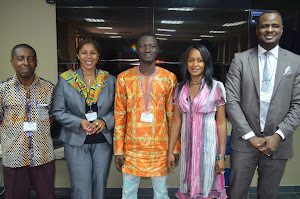By Edmund Smith-Asante, ACCRA
 |
| Eumerators taking data on a dis-functional water system. |
Rural water provision in Ghana has
received a major boost through the introduction of the use of the smartphone to
collect data on the performance of all water facilities provided for
communities, irrespective of who provided them.
These are the Upper East, Upper
West, Northern, Brong Ahafo, Central and Western regions where data has been
collected on about 20,000 hand pumps, including boreholes, hand-dug wells with
pumps, pipe systems comprising small town, small community and mechanised water
systems.
A total of 131 districts have,
however, been covered in the data collection procedure, leaving 85 districts in
four regions – the Greater Accra, Volta, Eastern and Ashanti.
The project is a public private
partnership supported by the International Water and Sanitation Centre (IRC),
Akvo and Skyfox Ltd, with collaborative funding from the government of Ghana,
the Dutch government, the World Bank, UNICEF, the Conrad Hilton Foundation and
SNV at a total cost of about €3 million.
Data collection process
In an interview with the Daily
Graphic last Monday, the focal person for the project and Director, Planning
and Investments at the Community Water and Sanitation Agency (CWSA), Mr
Benedict K. A. N. Kubabom, explained that the project entailed “using the smart
or android phone to capture data on the various water facilities we have on the
field.”
“This information is transmitted
straight to what we call the cloud (dashboard), which can be accessed if you
have Internet services.”
A total of 371 android phones have
been provided for the data collection, with each district receiving three
phones.
Mr Kubabom said the data collection
was done using a data collection tool or software known as the Field Level
Operations Watch (FLOW) that was developed by a Dutch company Akvo, formerly a
US-based company known as Water for People.
“So you just go to the site where
the system is, then you take the GPS location of the system, then you do a
stroke test on the system to see how many strokes will bring out the water,
then from there you go to the managers of the system (the water board or water
and sanitation committee) to interview them and then to the district assembly,
which is supposed to ensure that water services are properly managed in the
district and talk to them.
“There are questions on the
electronic form which are keyed in when answers are provided to the questions
asked and as soon as the data is captured, it goes straight to the dashboard by
means of the Internet,” Mr Kubabom said.
He added, however, that data could
be collected offline and later sent to the dashboard.
Every information gathered on the
field is downloaded and cross-checked or verified (cleaned) by Information
Technology (IT) personnel in CWSA’s regional offices before it is added to the
database on the dashboard.
Later, the data is transferred onto
excel sheets and analysed, from which graphs, pie charts, tables and others are
generated to give information on the districts in the region, the water systems
available and the number of systems functioning or not functioning, the water
management structure in place, water quality and other similar considerations,
he added.
Field personnel
Mr Kubabom said enumerators were
recruited in the districts to assist with the data collection in the districts
and then support was provided from the agency’s offices.
The project Coordinator, Mr Emmanuel
Atengdem, told the Daily Graphic that at the district level, over 700 staff
drawn from the community development, district planning and coordinating and
environmental health and sanitation units had received training to collect
baseline data from the field and also assess the performance of providers at
the communities.
At the regional level, apart from
CWSA staff, over 152 staff from the Regional Coordinating Council (RCC) and the
Ghana Statistical Service (GSS) have also been trained as trainers of trainers,
while about 30 personnel have been trained at the national level, he stated.
“So it means you can safely say
about 900 people have been trained under this project in the new framework for
rural water monitoring that has been developed,” Mr Atengdem said.
He said one of the challenges that
the CWSA faced was the lack of reliable and accurate data to make informed
investment decisions to do informed planning, budgeting and others. “Clearly,
if you do not know what the situation is, it becomes difficult to know what
action to take to address that particular situation,” he stated.
According to Mr Atengdem, the lack
of credible data also affected the kind of remedial actions that the agency had
to take to improve on service delivery.
Benefits of project
Touching on the benefits of the
project, he said it provided accurate data on water systems, enabled assemblies
to provide support where needed, identified gaps in communities to enable the
assemblies and CWSA budget adequately, and it afforded communities access to
potable water, as well as training for community and service providers.
He indicated that as a result of the
project, it had been identified that over 30 per cent of boreholes in the
Northern Region, which translates to over 1,000 of the facilities, were not
working. He said based on the projection that a borehole is supposed to serve
not more than 300 people, over 30,000 people therefore were denied access to
potable water.
Next phase
The next phase of the project would
be to track the response of the metropolitan, municipal and district assemblies
(MMDAs) to the data, seek additional funding for the remaining 85 districts to
have a complete national picture and see how the data collected impact on the
Ministry of Local Government and Rural Development’s functional organisational
assessment tool (FOAT) which assesses the assemblies based on the systems that
are functioning.
Writer’s email: edmund.asante@graphic.com.gh
This
story was first published by the Daily
Graphic on October 7, 2015





No comments:
Post a Comment